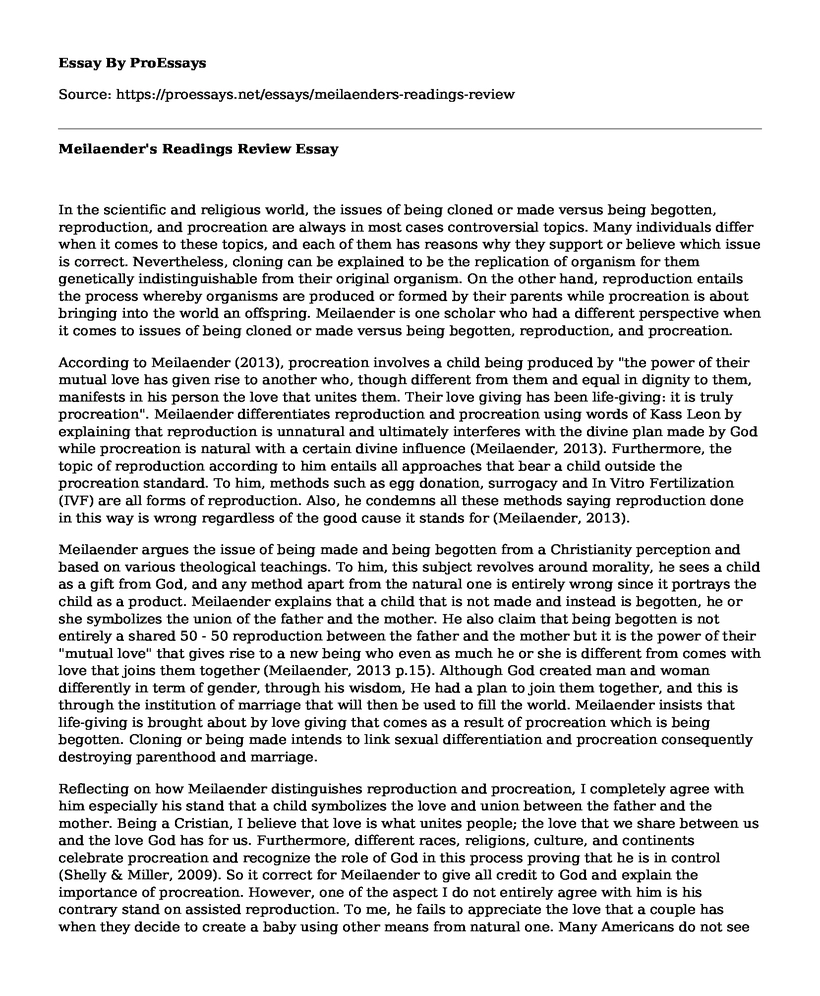In the scientific and religious world, the issues of being cloned or made versus being begotten, reproduction, and procreation are always in most cases controversial topics. Many individuals differ when it comes to these topics, and each of them has reasons why they support or believe which issue is correct. Nevertheless, cloning can be explained to be the replication of organism for them genetically indistinguishable from their original organism. On the other hand, reproduction entails the process whereby organisms are produced or formed by their parents while procreation is about bringing into the world an offspring. Meilaender is one scholar who had a different perspective when it comes to issues of being cloned or made versus being begotten, reproduction, and procreation.
According to Meilaender (2013), procreation involves a child being produced by "the power of their mutual love has given rise to another who, though different from them and equal in dignity to them, manifests in his person the love that unites them. Their love giving has been life-giving: it is truly procreation". Meilaender differentiates reproduction and procreation using words of Kass Leon by explaining that reproduction is unnatural and ultimately interferes with the divine plan made by God while procreation is natural with a certain divine influence (Meilaender, 2013). Furthermore, the topic of reproduction according to him entails all approaches that bear a child outside the procreation standard. To him, methods such as egg donation, surrogacy and In Vitro Fertilization (IVF) are all forms of reproduction. Also, he condemns all these methods saying reproduction done in this way is wrong regardless of the good cause it stands for (Meilaender, 2013).
Meilaender argues the issue of being made and being begotten from a Christianity perception and based on various theological teachings. To him, this subject revolves around morality, he sees a child as a gift from God, and any method apart from the natural one is entirely wrong since it portrays the child as a product. Meilaender explains that a child that is not made and instead is begotten, he or she symbolizes the union of the father and the mother. He also claim that being begotten is not entirely a shared 50 - 50 reproduction between the father and the mother but it is the power of their "mutual love" that gives rise to a new being who even as much he or she is different from comes with love that joins them together (Meilaender, 2013 p.15). Although God created man and woman differently in term of gender, through his wisdom, He had a plan to join them together, and this is through the institution of marriage that will then be used to fill the world. Meilaender insists that life-giving is brought about by love giving that comes as a result of procreation which is being begotten. Cloning or being made intends to link sexual differentiation and procreation consequently destroying parenthood and marriage.
Reflecting on how Meilaender distinguishes reproduction and procreation, I completely agree with him especially his stand that a child symbolizes the love and union between the father and the mother. Being a Cristian, I believe that love is what unites people; the love that we share between us and the love God has for us. Furthermore, different races, religions, culture, and continents celebrate procreation and recognize the role of God in this process proving that he is in control (Shelly & Miller, 2009). So it correct for Meilaender to give all credit to God and explain the importance of procreation. However, one of the aspect I do not entirely agree with him is his contrary stand on assisted reproduction. To me, he fails to appreciate the love that a couple has when they decide to create a baby using other means from natural one. Many Americans do not see assisted reproduction as a significant moral issue since it is usually a sign of love and commitment form the individuals who decide to take such steps (Engelhardt, 2007).
References
Engelhardt Jr, H. T. (2007). Long-term care: The family, post-modernity, and conflicting moral life-worlds. The Journal of medicine and philosophy, 32(5), 519-536.
Meilaender, G. (2013). Bioethics: A primer for Christians. Wm. B. Eerdmans Publishing.
Shelly, J. A., & Miller, A. B. (2009). Called to care: A Christian worldview for nursing. InterVarsity Press.
Cite this page
Meilaender's Readings Review. (2022, Apr 14). Retrieved from https://proessays.net/essays/meilaenders-readings-review
If you are the original author of this essay and no longer wish to have it published on the ProEssays website, please click below to request its removal:
- Essay Example on the Human Genome Project (HGP)
- Animal Cognition Is Evolving With the Changes in the Environment Essay
- Photosynthesis: Light, Water and Oxygen for Plants - Essay Sample
- Paper Example on Exploring Human Anatomy: A Systematic Study
- Exploring the Grand Canyon: Nature's Deepest Gorge - Essay Sample
- Utilitarianism on Animal Rights - Essay Sample
- Altitudinal Migration in East African Birds: A Comprehensive Ringing Recovery Study







